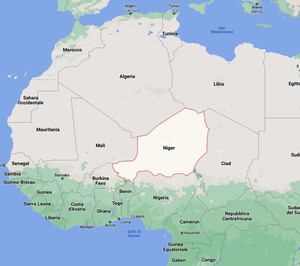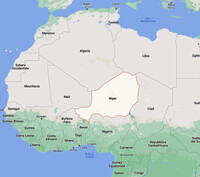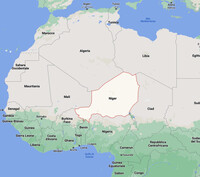No to ECOWAS intervention in Niger
OPEN LETTER BY PEACELINK, ITALIAN PEACE GROUP

NO TO ECOWAS ARMED INTERVENTION IN NIGER!
REMEMBER THE CONSEQUENCES FOR AFRICA OF NATO'S WAR IN LIBYA! TERRORISM, DESTABILISATION, POVERTY!
The ultimatums are a reminder of the tragic military aggressions of the West and its allies.
We call on ECOWAS not to play into the hands of other powers.
1. An armed intervention in Niger would be illegal under international law. Niger has not attacked any state (Article 51 of the United Nations Charter cannot therefore be invoked) and the coup d'état is an internal affair within the country. Under the UN Charter, Member States must refrain from the use or threat of force. An attack on Niger would therefore constitute a war of aggression, an act which, according to the 1946 Nuremberg Declaration, "is not only an international crime, it is the supreme international crime".
2. The consequences of NATO's war in Libya in 2011 have also been very serious for African countries. They have provoked or fuelled the spread of terrorism and the proliferation of criminal groups, and not only in West Africa. African countries should not be associated with catastrophic military operations. Let us recall the words of the President of the Bishops' Conference Burkina Faso - Niger, in which he said no to a military "solution", no "to the spectre of war that brings to mind a possible ‘second Libya’, while the deadly consequences of the destabilisation of this country continue to cause terrible suffering to the people of the Sahel".
3. There is a real risk that jihadist terrorists scattered across West Africa will take advantage of an armed intervention to legitimise themselves as defenders of Islam.
4. Military action against Niger would divert energy from the fight against the terrorists. Nigeria's opposition has reminded the country's president: "Fight Boko Haram instead" (the fundamentalist Islamist movement that has devastated northern Nigeria and is gradually spreading to other parts of the country).
5. The real "enemy" is poverty, exploitation and hunger, which a war would exacerbate by driving up national budgets and military spending.
6. We must respect the people of West Africa and the countries in the region that have said no to armed intervention! Mali, Burkina Faso and Guinea Conakry, but also Algeria and Chad, have spoken out against escalation. The Nigerian Senate has called for diplomatic action. In Benin, the Alliance pour la patrie (opposition group) has called on the government not to drag the country into a war for the strategic interests of others. Elsewhere too, people are worried and affected by the sanctions.
7. Economic sanctions, as always, affect people - in this case Niger - and must be lifted. What needs to be addressed from an economic point of view is rather the neo-colonialism that has exploited these regions, which are rich in resources but very poor because of the domination of rich Western countries, leading in the past to shameful and criminal actions such as the assassination of the African leader Thomas Sankara of Burkina Faso, with the complicity of France and the United States.
Alessandro Marescotti
President of PeaceLink
Articoli correlati
 Le véritable "ennemi" est la pauvreté, l’exploitation, la faim
Le véritable "ennemi" est la pauvreté, l’exploitation, la faimNon a l'intervention armée CEDEAO-ECOWAS au Niger
Une intervention armée au Niger serait illégale au regard du droit international. En effet, le Niger n'a attaqué aucun Etat (l'article 51 de la Charte des Nations Unies ne peut donc pas être invoqué) et le coup d'Etat est une affaire interne au pays.7 August 2023 - PeaceLink La minaccia di intervento militare è già di per sè una violazione della Carta dell'ONU
La minaccia di intervento militare è già di per sè una violazione della Carta dell'ONUNo all'intervento armato in Niger
Un intervento armato in Niger sarebbe illegale sulla base del diritto internazionale. Il Niger non ha infatti attaccato alcuno Stato e il colpo di Stato è affare interno del paese. Dietro tutto ciò ci sono in realtà gli interessi verso l'uranio del Niger6 August 2023 - Alessandro Marescotti Il Niger è fra le nazioni che violano i diritti umani, lo dice Amnesty International
Il Niger è fra le nazioni che violano i diritti umani, lo dice Amnesty InternationalControllare le migrazioni, vendere armi e addestrare i militari del Niger
Commercio d'armi. Svelato il trattato Italia-Niger: apre un nuovo mercato bellico. L'Italia inoltre addestrerà le forze armate di un governo accusato di arrestare persone "colpevoli" di aver esercitato la libertà di espressione8 February 2019 - Alessandro Marescotti- Taranto as in the Niger river delta: violated rights and children in danger
A dossier for Amnesty International
The similarities between Taranto and the Niger delta come from the extent of contamination and the objective responsibility of the industrial area8 July 2014 - Alessandro Marescotti
Sociale.network